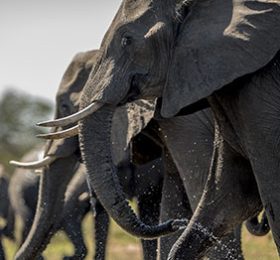Royal Manas National Park
Royal Manas National Park is located in Bhutan, not India, but it shares
similarities with Manas National Park in Assam, India, due to their
geographic proximity and shared ecosystems. Situated in the southern part of
Bhutan, near the Indian border, Royal Manas National Park is one of
Bhutan’s most significant protected areas, known for its incredible
biodiversity and rich cultural history.
Key
Features of Royal Manas National Park:
1.
Biodiversity Hotspot
Royal Manas National Park is home to
a rich variety of wildlife, much like its Indian counterpart. The park’s lush
forests, grasslands, and river systems support numerous species, including
endangered animals such as the Bengal tiger, Indian one-horned
rhinoceros, Asian elephant, and the elusive clouded leopard.
The park is also a haven for over 300 species of birds, making it an important
destination for birdwatching enthusiasts.
2.
UNESCO Biosphere Reserve
The park was designated as a UNESCO
Biosphere Reserve in 2001 due to its rich ecosystems and high
conservation value. It’s one of the most important biodiversity reserves in
Bhutan, protecting a range of habitats from tropical forests to alpine meadows.
3.
Project Tiger Reserve
Royal Manas National Park is also
part of the Project Tiger initiative, which aims to conserve tigers and
their habitats. Bhutan’s efforts to protect the Bengal tiger in Royal Manas are
integral to the larger conservation efforts across the region, as it is home to
one of the few remaining populations of tigers in the eastern Himalayas.
4.
Incredible Landscapes
The park’s landscapes are diverse
and stunning. It spans a variety of ecosystems, from the lowland tropical
forests near the Indian border to the steep, rugged terrains of the Himalayas.
The Manas River, which flows through the park, is a key feature of its
geography and helps support a rich variety of plant and animal life.
5.
Cultural and Spiritual Significance
Royal Manas National Park is not
just a place of natural beauty but also has cultural significance. It is
located in an area that has long been associated with Bhutanese heritage, and
the park’s proximity to the Indian border makes it an important region for
local communities. Bhutan’s commitment to preserving its natural resources is closely
tied to its cultural values of environmental stewardship and sustainable
development.
6.
Ecotourism and Conservation
As a protected area, Royal Manas
National Park is a focus of ecotourism in Bhutan. While the park is not
as frequently visited as some other parks in the region, it is becoming
increasingly recognized for its potential in promoting conservation and
sustainable tourism. Visitors to the park can enjoy activities such as wildlife
safaris, birdwatching, and trekking through pristine natural surroundings.
Conclusion
Royal Manas National Park is a gem of biodiversity, conservation, and natural beauty in Bhutan. With its varied ecosystems, endangered species, and cultural significance, it is a must-visit for anyone interested in exploring the natural heritage of the eastern Himalayas. While it shares a name and geographical proximity with Manas National Park in India, Royal Manas is unique in its own right, offering a rare and invaluable glimpse into one of the world’s most remarkable natural environments.
“We providing counsel by advisor for the insight-driven transformation to investment of banks, wealth and exchanges.”
– Jimmy Divison
Making Every Step Easy
- Wildlife Education Seminars
- 10M Conservation Programs
- people live with nature
- Save The Animals Movement


